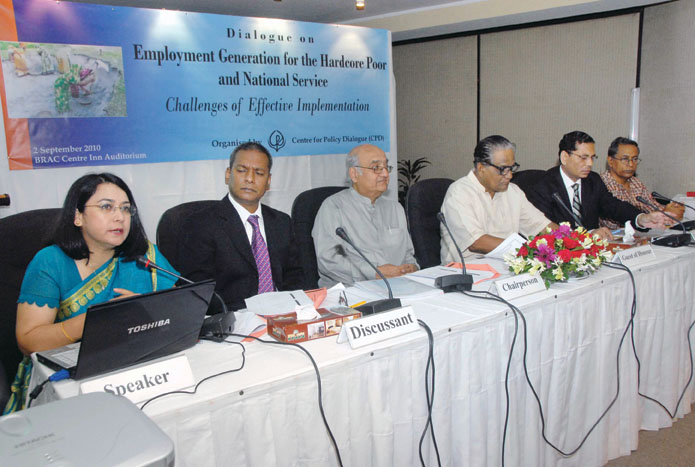The need to ensure transparency and accountability in the beneficiary selection under the safety net programmes was stressed by Dr Fahmida Khatun, Additional Director and Head of Research, CPD while presenting the keynote paper at a CPD dialogue on Employment Generation for the Hardcore Poor and National Service: Challenges of Effective Implementation. The dialogue was held on 2 September 2010, at the BRAC Centre Inn Auditorium, Dhaka. Professor Rehman Sobhan, Chairman, CPD chaired the dialogue while Mr Mohammad Sayedul Haque, MP and Chairman, Parliamentary Standing Committee on Ministry of Food and Disaster Management was present as the Guest of Honour.
The presentation was based on a CPD study which was undertaken to review the design and implementation, and to assess the impacts of the two employment generation programmes under the social safety net programmes (SSNPs) of the government.
Dr Khatun mentioned that the initiation of Employment Generation for the Hardcore Poor (EGHP) was a commendable step towards reducing poverty by providing employment to the poorest section of the society who were vulnerable due to high inflationary pressure and consequent price hike, and seasonal unemployment. The 100-DEGP, initiated earlier, had almost similar objectives, except for the intolerable price hike being the key consideration which prevailed during FY2007-08.
While conducting the study, CPD tried to make a comparison of the 100-DEGP and EGHP in terms of target area, beneficiary selection process, timeframe, wage and payment, and cost of administration. The study was based on a field survey conducted in 24 areas of four districts in Bangladesh. It was found that in some areas it was difficult to find labourers as the market wage rate was higher. Some cases of irregularities in terms of political influence and nepotism behaviour were observed. Dr Khatun noted that project selection and designing was top down with limited consultation with the local authorities. The CPD feels that EGHP should initially focus on highly poverty-stricken regions using poverty maps. Piloting can be very useful before expanding the programme nationwide, because once implemented throughout the country, it will be challenging to narrow down the coverage area, suggested the CPD report. It also proposed that the EGHP programme should have different timeframe for different areas based on seasonal and agricultural pattern.
While discussing the National Service, Dr Khatun informed that the GoB started the programme in FY2009-10 to develop particular group of educated but unemployed people as a productive workforce through training and temporary employment. The CPD study observed that there is a lack of proper training facility which needs to be well emphasised to maximise the benefits of the programme. Additionally, the National Service programme does not provide any guarantee for permanent employment. The CPD recommended that given the huge expenditure required for this programme, the government can tag it with the private sector, where students could be appointed as apprentices for a certain period by the entrepreneurs.
Mr Saiful Huq, General Secretary, Workers Party of Bangladesh and a Designated Discussant said, “formulation of an Employment Guarantee Scheme is our three decade-long demand to the government. The implementation of the SSNPs in Bangladesh may have some impact on the micro economy, but these do not have any impact on the macro economy of the country.” He suggested that government should match the national annual budget with the Medium Term Budgetary Framework, and ensure transparency in the monitoring and information system for effective implementation of the EGHP programme.
On the issue of corruption in the wage payment process of the EGHP programme, Mr Shaikh S Ahmed, Social Protection Economist of the World Bank, also a Designated Discussant, suggested that since 95 per cent unions have the banking facility, wage payment can be made through these banks. He also noted that in such cases it will be easier for the beneficiaries to use the mobile phone banking system. However, Dr Shapan Adnan, Professor of the Singapore National University disagreed with him and said “there is no guarantee that if the money/wage is transferred through bank, it will not be mismanaged, rather it will create an extra hassle for the beneficiaries as the banking sector is also not free from corruption.”
Speaking as the Guest of Honour Mr Sayedul Haque, MP, informed the dialogue that the government has attached utmost importance to the food security, to ensure sustainable development. Regarding the continuation of the SSNPs, initiated by the present government, he assured that as long as this government is in power, “there would be no break in the funding of this programme.” The lawmaker, however, acknowledged the presence of political influence in the selection process of the beneficiaries and termed the card distribution process as “problematic.” He asked all stakeholders to help the government formulate a strategy to select the poorest communities and an effective payment disbursement method.
One of the beneficiaries of EGHP, Ms Selina Begum from Nilphamari was present at the dialogue. She expressed her dissatisfaction about the SSNPs of the government by saying that she was not sure whether the programme is for the welfare of the rich or for the poor. “We have to pay bribe to the local politicians to be enrolled in the work, otherwise we do not get the job. We want money for work, not harassment,” she said.
While concluding the session Professor Rehman Sobhan, Chairman of CPD stressed the need for a comprehensive national policy to eradicate poverty, and urged the government to make an Employment Guarantee Act in order to find a sustainable solution, besides running the SSNPs.




